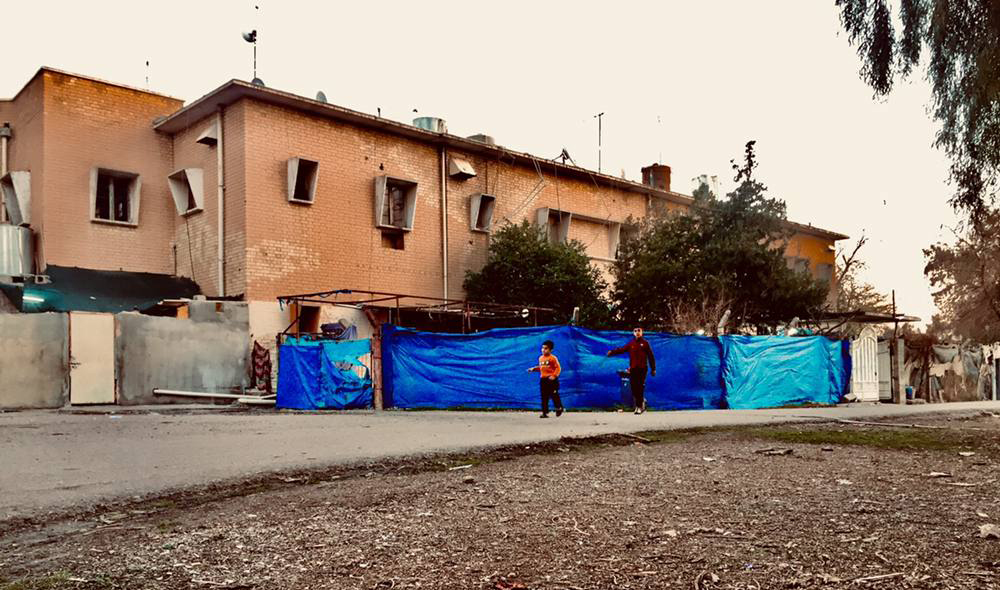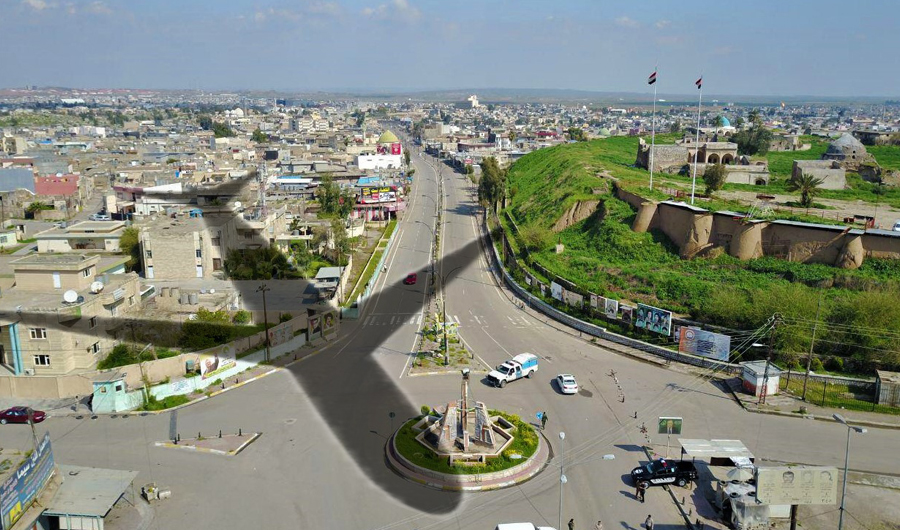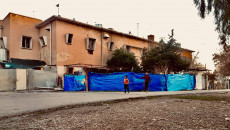The decision to demolish a number of houses built over lands overtaken by locals caused a rift between two of the most powerful Arab and Turkmen parties in Kirkuk, amid the exchange of accusations of being involved in "corruption, demographic change and the exploitation of positions for illegal acts."
The Arab Council, headed by the acting governor of Kirkuk, Rakan Saeed Al-Jibouri, attacked Falah Yaychili, the mayor of Kirkuk, who is of the Turkmen component, and accused him of "targeting" Arab citizens.
This accusation angered the most powerful Turkmen parties in Kirkuk, describing the reaction by the Arab Council as an attempt to create obstacles in the way of the work of the mayor.
This problem arose after Yaychili, launched a campaign with relevant state departments on August 16 to demolish a number of houses that were built on over state lands in the Kobani neighborhood, some of the houses near Kirkuk airport, inhabited by Arab families.
This step came, according to information obtained by (KirkukNow), after the federal government sent a final notification to the Kirkuk local administration of the need to tighten the security belt around the airport, forcing the mayor to take a number of measures, including removing the abuses in the Kobani neighborhood, south of the city of Kirkuk is in preparation for the opening of the airport, which has been rehabilitated for more than four years, and despite the completion of the project, the airport has not yet opened.
In a press conference held on August 20, the Arab Council stressed that the mayor of Kirkuk, is taking advantage of his position for “illegal gains” and accused him of carrying out an “unjust campaign with an ethnic and racist motive and selectively demolishing a number of homes for Arabs without warning.”
People close to the governor are involved
A spokesman for the Arab Council, Azzam al-Hamdani, read out in the council’s statement, “Falah Yaychili left the violations in the city center, which was built on the most important lands designated for services, and he overlooked those houses built at the outskirts of Kirkuk university.”
During the press conference, the Arab Council accused the head of the property department in the Kirkuk governorate office of providing assistance to the mayor in this case.
The acting mayor of Kirkuk and the official in charge of the Property Department in the Kirkuk Province Diwan are both from the Turkmen community, nominated by the Iraqi Turkmen Front ITF.
Video: The press conference of the Arab Council in Kirkuk
After 2003 and the fall of the Baath regime headed by Saddam Hussein, thousands of houses were built on state-owned lands yet without official permission in all of Iraq's provinces, including Kirkuk.
There are more than 60,000 houses and commercial buildings were built illegally in Kirkuk province, which ranks third after Baghdad where more than 130,000 units were built illegally built and 90,000 in Basra southern province, according to an official statistic obtained by KirukNow from the mayor of Kirkuk.
Following fall of Saddam regime in 2003, thousands of people expelled from Kirkuk and disputed territories, mainly Kurds and Turkmens, have received plots of lands or green light from the political parties ruling the region without being officially registered or permitted by local and federal authorities.
Kirkuk administration provided basic services to some of the blocs but later it was stopped by Iraqi government. The local authorities gave notice of evacuation to the residents whom declined to leave unless compensated.
The northern oil-rich city of Kirkuk, 238 kilometers north of Baghdad, is an ethnically mixed province for 1.7 million Kurds, Sunni and Shiite Arabs, and Turkmens. It has long been at the center of disputed territories between Baghdad and Erbil.
Kirkuk is one of the main disputed areas in addition to Diyalah and Nineveh that a three-stage process outlined in Article 140 of the Iraqi constitution in 2005, stipulating normalization, a population census and a referendum on the status of the territories, was drawn to put an end to Kurdistan region government KRG and Iraqi Federal government dispute over these areas.
The accusation of Turkmen officials angered the ITF and Turkmen parliamentarians, who threatened to reveal "corruption operations" in the implementation of projects in Kirkuk.
Gharib Askar, a Turkmen representative in the Iraqi parliament, threatened in a statement issued after the press conference of the Arab Council to reveal a set of "corruption documents" in the Kirkuk projects, in which he accused "people close to the governor" of being involved.
This comes at a time when the head of the Arab Council, Rakan Saeed, is considered the first responsible for these projects, as he is the governor of Kirkuk, especially after the dissolution of the provincial councils and the absence of monitoring of their performance.
"There is no need for them to accuse the mayor of demolishing abuses, at a time when you see many Arab officials buying and selling many plots of land in Kirkuk province," Askar added. He also said that seeks to achieve a balance in the distribution of administrative positions in Kirkuk, even if it cost him his life.
"The dreams of the Baathists have evaporated. This era is the era of democracy," he said.
The mayor appeared in a video footage on August 16 during the implementation of a campaign to demolish a number of houses in the Kobani neighborhood, saying that the campaign is being implemented in cooperation with a number of state departments, including the Real Estate Registration Department, Agriculture, Municipality and the security services, adding that they have "the support of the governor of Kirkuk."

In addition to the Kobani neighborhood, the Kirkuk administration has been seeking since 2019 to vacate the houses built on encroached land, especially near the Kirkuk airport, including the Hamzli neighborhood, which according to (Kirkuk Now) includes 620 houses, but the efforts of the Kirkuk administration to demolish the neighborhood have not yielded anything.
The majority of the residents of Hamzli neighborhood are of the Turkmen component, in addition to a small number of Arab families.
The Iraqi Civil Aviation Authority has not yet decided to open Kirkuk Airport, and the security aspect is one of the obstacles.
Rakan Saeed said in a statement he made to (KirkukNow) last week, "We have formed a committee to investigate and complete the procedures for the opening of the airport, including strengthening the security aspect in the vicinity of the airport and the security inspection of the families living in the vicinity of the airport," without giving further explanations as to whether these families will be excluded or not.
The Cabinet's decision to officially register houses built on overrun lands for its tenants must be implemented
The ITF, which consists of a number of Turkmen parties and is considered the strongest Turkmen party in Kirkuk and Iraq, responded on August 20 to the accusations of the Arab Council of the mayor and issued a statement denying all the accusations and stressing their rejection of any endeavors for demographic change in the city, and specifically mentioned southern Kirkuk.
"What these two officials have done is part of the legal procedures entrusted to them," according to the ITF statement.
On Saturday, August 20, the representative of the Turkmen Front, Arshad al-Salihi, awarded a certificate of appreciation to the mayor and the official in charge of state properties at governorate office, “in honor of their efforts to preserve the law and protect state property,” as he described it.
The Patriotic Union of Kurdistan PUK, which is currently the strongest of the Kurdish parties in Kirkuk, published a statement through Representative Dylan Ghafour on August 20 on the issue of abuses in Kirkuk, stating, "The Cabinet's decision to officially register houses built on overrun lands for its tenants must be implemented, otherwise we will resort to the street and the courts.”
This comes after the houses of the Kurdish people in the province were demolished several times, as they were built illegally after 2003.
In November 2019, the General Secretariat of the Iraqi Council of Ministers decided to register the infringed residential lands, outside the basic designs of cities in all governorates of Iraq, after estimating the value of the land by specialized committees. The decision stipulated the payment of an amount of 5% of the piece allowance, and the rest in installments for a period of 20 years, but this decision has not been implemented in any Iraqi governorate so far.
On August 20, the commander of joint operations in Kirkuk, Ali Al-Fireji, met with Rakan Saeed, Arshad Al-Salihi and Gharib Askar, and according to information obtained by (Kirkuk Now), he called for calming the situation, but it is yet clear whether the mayor of Kirkuk will continue the campaign to remove abuses, or will suspend it.






